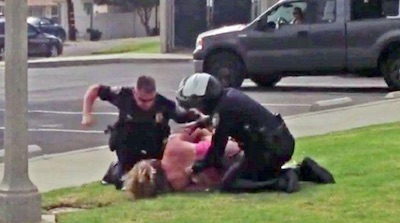Not too long ago, a Grok post made a couple of interesting claims. First, that ‘people are not innocent victims if they are injured in the struggle to arrest them’. Second, that ‘to protect the public, police are charged to complete an arrest even if there is resistance’.
I beg to differ with both claims.
First, if an arrest shouldn’t happen in the first place, any person injured during that arrest is an innocent victim, just as he would be an innocent victim if injured by a firearm that was discharged when it shouldn’t have been.
Second, if an arrest is technically legal, but the person is being arrested for a victimless ‘crime’, then the police are not protecting the public. They’re just enforcing policies preferred by the majority, against a minority that has not consented to those laws. A member of the minority is thus completely within his rights to resist an arrest, just as he would be within his rights to resist any other form of kidnapping.
Third, it’s not the job of the police to protect the public. It’s the job of the police to protect the rights of the public. In the overwhelming majority of arrests, they are doing very nearly the opposite.
Fourth, withdrawing rather than completing every arrest might mean that sometimes guilty people might get away. But one of the bedrock principles of our society is that it’s better for a hundred guilty people to escape punishment than for one innocent person to be punished. At least, it used to be.
What we’ve lost sight of is that the presumption of innocence doesn’t just begin when a person appears in court. Presumption of innocence begins at birth, and ends only when a conviction is obtained. And it begins again as soon as punishment is completed.
But as Radley Balko explicates in his book Rise of the Warrior Cop, the police increasingly treat an arrest itself as a form of punishment, whether that’s trashing someone’s home during a TWAT¹ raid, applying a chokehold or a boot to his neck, shooting his chihuahua as it runs away, or just killing him because he fails to follow the contradictory instructions being shouted at him.
And they are not just allowed, but encouraged to do this by legislatures, by courts, and ultimately by people who, as Harry Browne said, aren’t concerned about protecting rights they don’t think they’ll ever have to use. People like the author of that post, who apparently thinks that the presumption of innocence ends as soon as the process of arrest begins.
¹ In the introduction to Balko’s book, he notes that SWAT-style tactics ‘[were] once reserved as the last option to defuse a dangerous situation, [but] are increasingly used as the first option to apprehend people who aren’t dangerous at all.’ This suggests that we ought to replace ‘Special’ with ‘Typical’ in the acronym SWAT.
